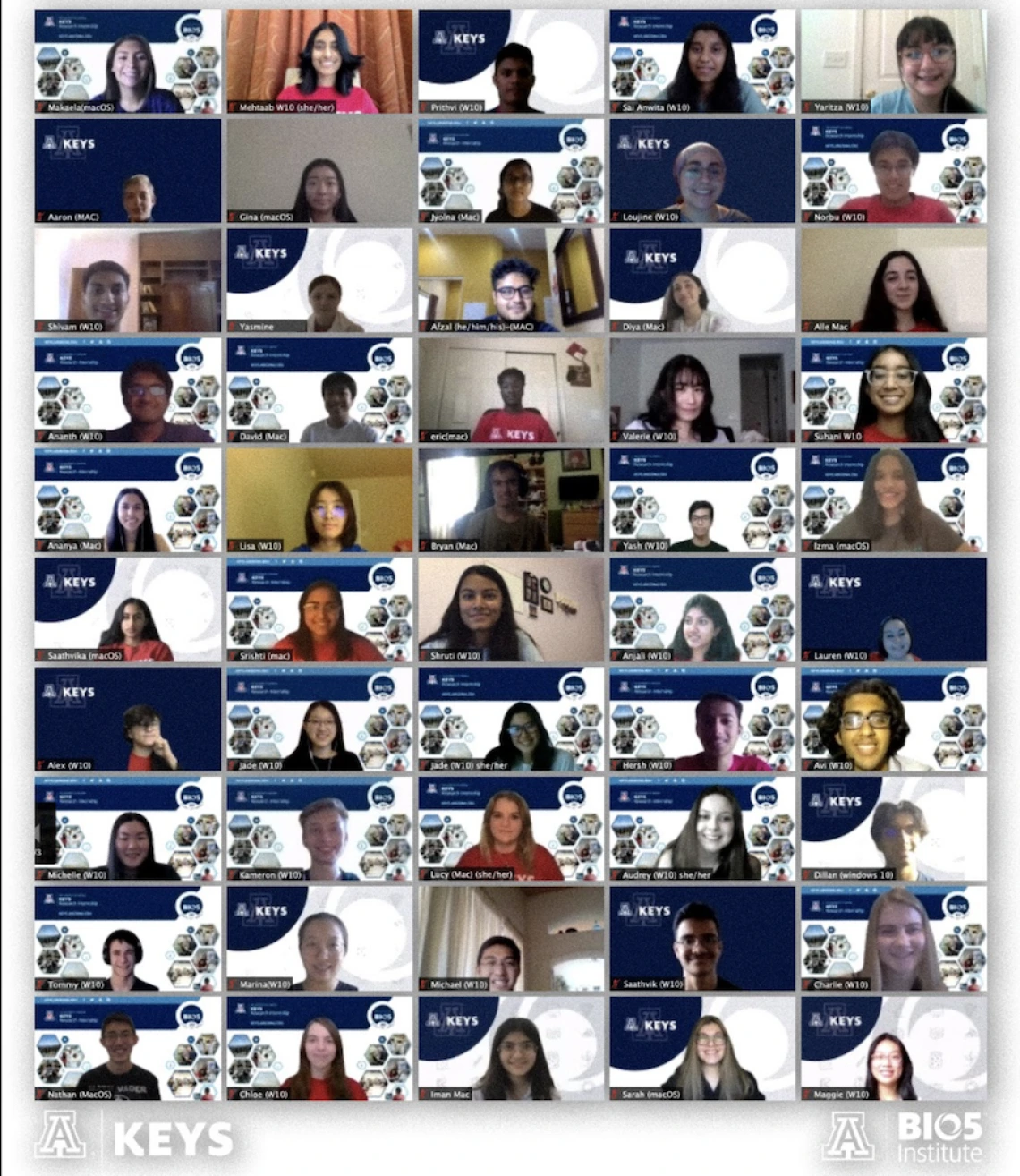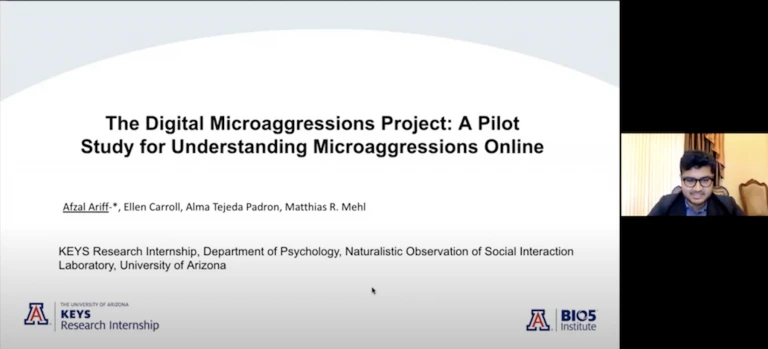Bright AZ High Schoolers Conduct Data-Driven Studies Alongside UArizona Researchers
The 2021 KEYS research program provided 50 students with a remote summer internship focused on science literacy and data science.

The 2021 KEYS program enabled high schoolers to tackle data science research projects remotely this summer.
Fifty talented students representing 26 Arizona high schools recently completed the intensive seven-week Keep Engaging Youth in Science (KEYS) research internship.
Founded in 2007, KEYS is a competitive program at the BIO5 Institute that immerses exceptional high school students in innovative research with top UArizona faculty and provides them with an unparalleled education in basic bioscience and data science techniques and science literacy. This year’s graduating class joins 526 KEYS alumni who have gone on to receive prestigious awards and scholarships, complete advanced degrees, and become essential members in the STEM workforce.
The 2021 KEYS program was conducted entirely online like last year, enabling students from across the state to work remotely on data science research projects. Prior to engaging in research, students learned about the fundamentals of data science, collaboration, communication and science literacy from BIO5 staff and faculty.
Equipped with foundational knowledge, KEYS students began working on projects including the prevention of age-related illnesses, deciphering the genetic causes of childhood seizures, and understanding climate change through soil temperatures.
Because spending 40 hours a week on Zoom can be mentally and physically exhausting, KEYS co-directors Kelle Hyland and Brooke Moreno placed great care into addressing “Zoom fatigue” when designing this year’s programming.
“To ensure our students weren’t getting tired of staring at their screens all day, we made sure to decrease the amount of structured computer time by incorporating frequent 15-minute breaks and staff-led breathing and stretching exercises,” Moreno said.
KEYS Crew mentors also focused on decreasing Zoom fatigue by leading active and mindful icebreaker activities, team building exercises, and weekly socials. These activities also helped to build a community among the interns and Crew mentors.
"We recognize that interns don’t have the same opportunity online to talk in passing or during breaks, so the socials were even more important to allow students to learn more about their peer’s talents and hobbies and bond through that time together,” said Robyn Pratt, KEYS Crew Captain. “We also hosted unstructured Zoom times with interns to allow them to make connections with KEYS Crew and their fellow interns."
At the end of the program, KEYS interns developed scientific posters and presented their findings during KEYS presentation week.
Learn more about three of the 2021 interns below.
Understanding reactions to online microaggressions
Rising Sandra Day O’Connor High School senior Afzal Ariff applied to KEYS to explore his passions through research and gain mentors in the scientific community.
Paired with Dr. Matthias Mehl, professor of psychology, Ariff helped develop a survey that captures the psychological response to receiving an online microaggression. The survey asked participants, who included people of various minority groups, to upload a screenshot of the microaggression they received and answer a series of questions about their experience, including how it affected them emotionally and how often they thought about the microaggression.
With this data, Ariff and Mehl aimed to create a more objective definition of a microaggression, as well as correlate it to various psychological aspects such as rumination time and stress.
Over the course of his internship, Ariff was amazed by the difficulties of studying social science and the human experience.
“I think this type of research might be way harder than mixing chemicals at the lab bench because humans are so different,” he said.
KEYS has taught Ariff that research is not a simple process – instead, it involves many twists and turns. However, he knew that even if his research did not produce the expected results, he would still be able to learn an immense amount about leading a pilot study focused on human behavior and emotion.
Ariff’s interests in better understanding the human experience extended to his career goals. While he doesn’t yet know where he’ll attend college, Ariff desires to combine his passions for community outreach, problem solving, and clinical work with a major in public health. He’s especially motivated to pursue this field in light of recent social uprisings.
“I have a strong desire to help the underdogs,” he said. “I want to uplift underserved communities and integrate that into every aspect of human life.”
Slowing down the movement of electrons
Since 2018, the College of Science has supported several interns in pursuing physics-based research projects. Incoming Sunnyside High School senior Yaritza Durazo was drawn to the KEYS program for this unique physical science opportunity.
“I was always interested in all types of science at a young age, and physics seems to apply to just about everything, so it’s a perfect fit for me,” she said.
Durazo worked with Dr. Arvinder Sandhu, professor of physics and optical sciences. Together, they studied the use of attosecond technology to detect unknown gasses and better comprehend the energy of electrons.
While we perceive time on a scale of seconds, minutes or hours, molecules, atoms and atom components, including negatively charged electrons, have a much faster time scale known as the attosecond. To put it into perspective, an attosecond is to a second what a second is to almost 32 billion years.
Since humans can’t comprehend that fast of movement, Durazo and Sandhu aimed to better conceptualize this time scale to understand the movement of electrons in both known and unknown gasses.
Applications for their work span the field of quantum mechanics and may ultimately allow researchers to control molecules and visualize their movement with their own eyes.
Though still a year away from graduating, Durazo hopes to study either optical sciences, engineering or physics at UArizona.
“I’ve always dreamed of going to the UA, and because of KEYS, I’m hoping to continue doing research through high school, undergrad, and maybe even grad school,” she said.
While Durazo’s learned a great deal about physical science research, her biggest takeaway from the KEYS program is more personal.
“From KEYS, I’ve felt so welcome in the scientific community and learned that I can really tackle difficult things,” she said. “I’ve become more confident in myself and my abilities, so it’s been a really validating experience.”
Making connections between genomic parasites
To prepare for college, 2021 South Mountain High School graduate Audrey Sweten just had to apply to KEYS.
“I knew KEYS would give me a jumpstart into research,” she said. “I was particularly excited to apply to this year’s data science program because I wasn’t the best at coding, but I knew learning more about it and using it in my research would be incredibly helpful in the future.”
Sweten worked alongside Dr. David Baltrus, associate professor of animal and comparative biomedical sciences and plant sciences at the BIO5 Institute. Together, they studied IS5 elements, so-called “genomic parasites” that jump around and turn on different genes in bacteria, including those that encode for antibiotic resistance.
Sweten mined for patterns in IS5 elements between different strains of bacteria to see if there were any evolutionary-based connections. By better understanding these genomic parasites, researchers might be able to use them for genetic engineering or to tackle antibiotic resistance.
This project was a perfect fit for Sweten, as she plans to major in microbiology and molecular and cellular biology at UArizona this fall. She ultimately aspires to specialize in infectious disease pathology, particularly as it relates to epidemics and pandemics, perhaps with a job at the CDC.
Sweten especially enjoyed the connections she made with her fellow interns, lab mates, and KEYS Crew leader this summer.
“When you’re doing research virtually, it can be easy to feel as if you’re alone, but when you see that there are 49 other interns doing the exact same thing as you, it’s great to know that you have a community and endless support,” Sweten said.
About the University of Arizona BIO5 Institute
The BIO5 Institute at the University of Arizona connects and mobilizes top researchers in agriculture, engineering, biomedicine, pharmacy, basic science, and computational science to find creative solutions to humanity’s most pressing health and environmental challenges. Since 2001, this interdisciplinary approach has been an international model of how to conduct collaborative research, and has resulted in disease prevention strategies, promising new therapies, innovative diagnostics and devices, and improved food sustainability.
About the Technology and Research Initiative Fund (TRIF)
The Technology and Research Initiative Fund (TRIF) that helped launch BIO5 in 2001 continues to be a catalyst in enabling effective, cross-disciplinary bioscience research and innovation at the University of Arizona, where initiatives and projects are carefully chosen to align with areas of state and national need. Over the past 20 years of TRIF, over $50M has been invested in building critical facilities and research services that UArizona is leveraging today to respond to the world’s greatest scientific mysteries. TRIF resources are also instrumental in funding events, programs and grants that promote STEM education, research and literacy.

Afzal Ariff presents his research to his mentors, family and friends via Zoom.

